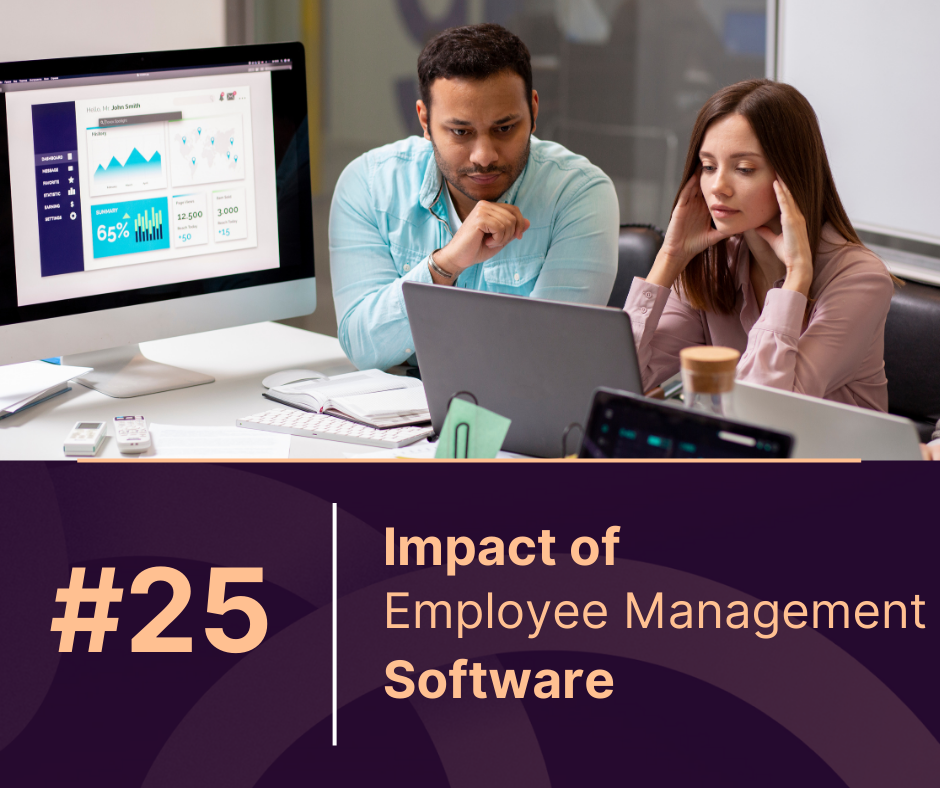In today’s fast-paced business world, the ability to manage employees efficiently is crucial to success. With organizations becoming more complex, the traditional methods of handling tasks like tracking attendance, performance reviews, and payroll management are not enough. This is where employee management software plays a vital role. It helps businesses streamline HR processes, improve productivity, and maintain a happier, more engaged workforce. In this blog, we’ll dive into how employee management software impacts businesses and why it is a game-changer.
1. Streamlined HR Processes
One of the most significant advantages of employee management software is its ability to automate and streamline HR processes. From onboarding to performance evaluations, it consolidates all HR tasks into one platform, eliminating the need for manual work and reducing errors.
For example, automating payroll and attendance systems ensures that HR teams no longer have to spend countless hours managing these processes manually. This automation allows businesses to focus on more critical tasks, like employee development and engagement.
2. Better Data Management
HR teams deal with enormous amounts of data, from personal employee information to performance reviews and legal compliance documentation. Storing and managing all this data manually can lead to lost information, mismanagement, or compliance risks.
With employee management software, businesses can store data securely in a digital format. This not only makes it easier to retrieve information when needed but also ensures that it is stored in a compliant and organized manner. The software often comes with encryption and secure data storage, so sensitive employee information is protected from data breaches.
3. Enhanced Employee Engagement
Employee engagement is a vital aspect of a company’s success. Engaged employees are more productive, motivated, and committed to their organizations. Employee management software allows HR teams to track employee satisfaction, feedback, and performance metrics regularly. This continuous monitoring helps HR professionals to identify areas where employees may need support or motivation.
Additionally, many employee management platforms come with self-service portals where employees can check their leave balances, view their performance reviews, or even request time off. This transparency and accessibility increase employee engagement as they feel more involved and valued.
4. Improved Workforce Productivity
Employee management software offers tools for tracking employee performance, which helps businesses identify top performers and those who may need further development. Managers can set goals, track progress, and evaluate results more efficiently, thanks to real-time data and performance analytics.
By having access to detailed insights into their workforce, managers can make more informed decisions and tailor their strategies to drive better results. This leads to a more productive workforce, as employees are often more motivated when their efforts are aligned with organizational goals and are regularly recognized.
5. Compliance with Labor Laws
Staying compliant with labor laws and regulations is critical for businesses. Mistakes in payroll or benefits management can lead to hefty fines and damage a company’s reputation. Employee management software simplifies this by automatically calculating payroll based on labor laws and company policies. It ensures that organizations remain compliant with ever-changing regulations without the need for constant manual updates.
6. Cost Savings
Although investing in employee management software may seem like a considerable upfront cost, it saves businesses money in the long run. By automating time-consuming manual tasks and reducing errors, businesses can cut down on HR operational costs. Plus, the time saved can be used to focus on strategic planning, improving productivity, and enhancing employee satisfaction.
7. Employee Development and Training
Development and training are critical to employee growth and retention. Employee management software can track employee skills, identify gaps, and suggest training or development programs. This not only helps employees grow but also enables the organization to build a more skilled and competent workforce.
Additionally, tracking employee development ensures that no one is left behind. Managers can ensure that all employees are given the same opportunities to improve their skills, thereby fostering a culture of continuous improvement.
8. Flexibility and Scalability
Modern employee management software is cloud-based, allowing businesses to access their HR tools from anywhere at any time. This flexibility is essential for companies with remote or global teams, as it ensures that HR operations run smoothly, no matter where employees are located.
Moreover, these platforms are highly scalable, allowing businesses to add more features or users as they grow. This makes them a valuable investment for businesses of all sizes, as they can adapt to the organization’s needs over time.
9. Better Decision Making
Employee management software comes with advanced analytics that can give insights into your workforce’s performance, attendance patterns, and overall productivity. This data-driven approach allows managers and HR professionals to make better decisions, whether it’s related to hiring, promotions, or retention strategies.
By having accurate data at their fingertips, businesses can avoid costly mistakes and ensure that they are making decisions that align with their organizational goals.
Conclusion
In today’s digital age, employee management software is no longer a luxury but a necessity for businesses that want to stay competitive. It not only simplifies HR processes but also provides valuable insights into workforce performance, enhances employee engagement, and helps companies remain compliant with labor laws. Investing in the right employee management software can significantly improve overall business efficiency, reduce costs, and create a more motivated and productive workforce.
Question and Answer
Q1: How does employee management software enhance employee engagement?
A: Employee management software provides self-service portals, performance tracking, and regular feedback mechanisms. This transparency and accessibility allow employees to feel more involved in their own progress and valued by the organization, which increases engagement.
Q2: Can employee management software help in legal compliance?
A: Yes, employee management software can help businesses stay compliant by automating payroll, tracking working hours, and keeping up with labor law updates. This minimizes the risk of human error and ensures accurate and timely compliance with local regulations.
Q3: Is employee management software only for large companies?
A: No, employee management software is highly scalable and can be adapted for businesses of all sizes. It helps streamline processes, no matter the size of the workforce, and can grow with the business as needed.
Q4: How does employee management software help in decision-making?
A: The software provides data-driven insights into employee performance, attendance, and productivity, helping managers make informed decisions about hiring, promotions, and workforce strategies.



